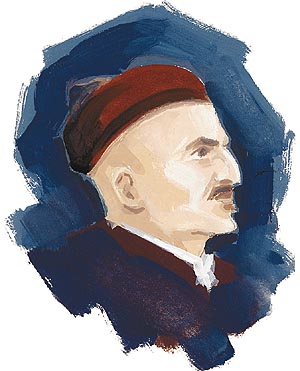VERY little is known about Pandit Vishnu Narayan Bhatkhande's ancestry and his early years. It is believed that his father was incharge of Zawba Gora Ram Temple, and was a musician fond of playing the swarmandal.
 In his formative years Bhakhande was greatly inspired by Gyanotejak Mandali, the oldest music academy in India, founded by the Parsis in 1870. As he grew up and studied music deeply, he realised that India classical music had not only degenerated in the past centuries, and though it was of great merit, it was not systematised scientifically, thus leading to confusion and acrimony among its various practitioners. After careful thought he undertook the mammoth and spine-breaking task of codifying and writing Indian music. For the next twenty-five years of his life, he travelled all over India, met great masters, read whatever was available, and made exhaustive researches. He spent another 25 years studying contemporary and classical western music, modifying and adapting the Western notation system to suit Indian music.
In his formative years Bhakhande was greatly inspired by Gyanotejak Mandali, the oldest music academy in India, founded by the Parsis in 1870. As he grew up and studied music deeply, he realised that India classical music had not only degenerated in the past centuries, and though it was of great merit, it was not systematised scientifically, thus leading to confusion and acrimony among its various practitioners. After careful thought he undertook the mammoth and spine-breaking task of codifying and writing Indian music. For the next twenty-five years of his life, he travelled all over India, met great masters, read whatever was available, and made exhaustive researches. He spent another 25 years studying contemporary and classical western music, modifying and adapting the Western notation system to suit Indian music.
A great scholar that he was, he wrote such exhaustive treatises as Shrimallakshya Sangeetam, Abhinava Ragamanjari, Abhinava Talamanjari, in Sanskrit; and Hindustan Sangeet Paddhati (4 vomumes) in Marathi, and in English he wrote the 2500 page magnum opus: A Comparative Study of the Music Systems of 15th, 16th. 17th and 18th Centuries. His other mammoth volume was the 3000 page Historical Survey of the Music of India. All these books were written between 1908 and 1933.
Impressed by Bhatkhande's dedication to music, Maharaja Sayajirao Gaekwad of Baroda handed him over the Government College to him; Maharaja Madhavrao Scindia of Gwalior sought his expert advice and started Madhav Sangeet Vidyalaya; and at Lucknow founded Morris College of Music, now renamed Bhatkhande Sangeet Mahavidyalaya. In order to popularise classical music he also organised numerous music conferences in Baroda, Delhi, Lucknow.
Since he tried to make radical changes to the existing music tradition, he faced stiff opposition, especially from his contemporaries, but he carried on with his herculean task.
He adopted an ingenious methods to confound his critics by writing his books under various pseudonyms. He wrote Lakshyasangeet as, Bharatpurva-
khandanivasi Chaturpandit, Hindustan Sangeet Paddhati, as Pandit Vishnusharma, and for his compositions he used - Chatur, Harrang and so on, and for his text books he used his real name. If someone, let's say, criticised his views in Lekshyasangeet, he would refute the critics by quoting Pandit Vishnusharma (his own pseudonym)!
He and Vishnu were not very friendly. He was a scholar and scientist, whereas Paluskar was a saint and performer. Because Paluskar established the Gandharva Mahavidyalaya, and went on to train a number of great musicians, his services received immediate recognition, whereas Bhatkhande's contribution though equally great, was not so easily appreciated.
3 comments:
Nice info
Very good
Thanks for the info.
Sanjeeb Sircar
www.sanjeebsircar.com
Post a Comment